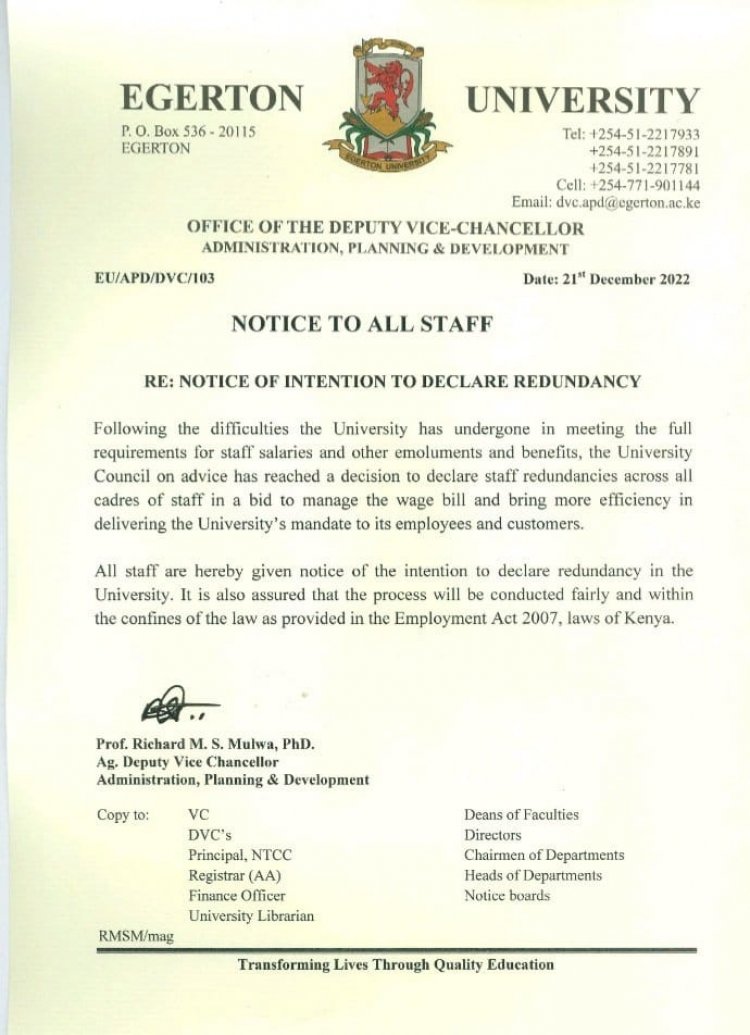Egerton University Declared Redundant Following Influx of GMO in Kenya
The die of Egerton was cast by the multinationals that are pushing GMOs to Kenya and other parts of Africa.

Egerton University announced its intention to declare redundancy. For clarity, let me define redundancy. re·dun·dan·cy
/rəˈdənd(ə)nsē/ Its the state of being not or no longer needed or useful.
Egerton University is the oldest higher learning institution having been founded in 1939 as a Farm School by Lord Maurice Egerton of Tatton, a British national who settled in Kenya in the 1920s. In 1950, the School was upgraded to an Agricultural College offering diploma programmes.
The facility was later established through an Act of Parliament by the Universities Act No.42 of 2012. Egerton, which is famed for being the producer of well-researched organic seeds and plants has now been declared to be no longer relevant. And whoever works there has no more use for the world economy.
On 21st December 2022, Deputy Vice-Chancellor Richard Mulwa, sent a notice to the staff of intentions to declare redundant Egerton University.

However, Prof. Mulwa is just a mouthpiece. The die of Egerton was cast by the multinationals that are pushing GMOs to Kenya and other parts of Africa.
In December 2022, the Kenyan government imported over 10 million bags of genetically modified maize in a bid to fight hunger. This happened a few months after the government lifted the ban on genetically modified crops in the country.
A statement issued by President William Ruto’s office after he chaired a cabinet meeting described lifting the ban as part of responses to the drought, authorizing the cultivation and importation of genetically modified white maize.
"Cabinet vacated its earlier decision of 8th November 2012 prohibiting the open cultivation of genetically modified crops and the importation of food crops and animal feeds produced through biotechnology innovations; effectively lifting the ban on Genetically Modified Crops," the statement read.

Well, let us get to the gist of it, despite the financial difficulties that the institution has been having over a long period of time, which have even seen its Vice Chancellor Prof. Isaac Kibwage being jailed for 30-days for defying an order issued on May 30, 2022, to pay lecturers full salary, one would wonder how could such a government institution be declared redundant?
Well, the unsaid is that the intention of multinationals that produce GMOs is determined to kill Egerton as they flood their products in Kenya and across Africa.
The Institute aimed at addressing; micro and macroeconomic policy issues bearing on farming, transportation, processing, marketing, and trade of agricultural products and inputs; sustainability of agricultural systems and natural resources as well as the environment; and commercialization, income growth, and food security.
However, with the notice, any students studying those core subjects are useless in the eyes of the multinationals. Their time has passed. Just like typists of the past were redundant and useless when computers were introduced, so will our farmers be in a few short years. Their fate has been determined in boardrooms in Europe and America.
The only problem with this equation is that GMOs are detrimental to our health. With this knowledge, some farmers and campaign groups have resisted the introduction of GMO foods in the market as they question their safety.
Despite the cabinet noting that they considered expert and technical reports on biotechnology, including by United Nations agencies the World Health Organization, and the Food and Agriculture Organization in making its decision on GMO crops and food, a majority of Kenyans aren’t convinced why they choose this route.
The announced intention to declare Egerton University redundant furthers the concerns caused by the decision of the cabinet to lift the ban on GMO crops in the country. With it being rendered “useless” so to say, over 589 academic and 1,352 nonacademic staff serving a population of 17,928 undergraduates and 560 postgraduate students will be left unemployed and the students “stranded” so to say. Most of them may have to get back to other institutions to re-tool themselves with an alternative or entirely different skills that will make them marketable in the already flooded job space.
If you have a real estate press release or any other information that you would like featured on African Real Estate Blog Post do reach out to us via email at [email protected]

































